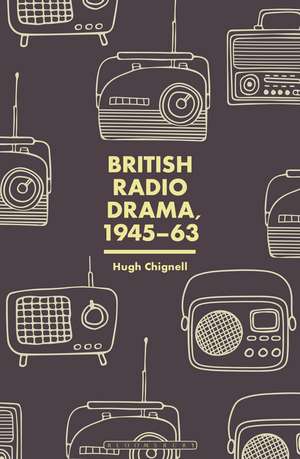British Radio Drama, 1945-63
Autor Professor Hugh Chignellen Limba Engleză Hardback – 18 sep 2019
| Toate formatele și edițiile | Preț | Express |
|---|---|---|
| Paperback (1) | 216.08 lei 43-57 zile | |
| Bloomsbury Publishing – 24 feb 2021 | 216.08 lei 43-57 zile | |
| Hardback (1) | 713.72 lei 43-57 zile | |
| Bloomsbury Publishing – 18 sep 2019 | 713.72 lei 43-57 zile |
Preț: 713.72 lei
Preț vechi: 1027.16 lei
-31% Nou
Puncte Express: 1071
Preț estimativ în valută:
136.57€ • 142.97$ • 113.00£
136.57€ • 142.97$ • 113.00£
Carte tipărită la comandă
Livrare economică 07-21 aprilie
Preluare comenzi: 021 569.72.76
Specificații
ISBN-13: 9781501329692
ISBN-10: 1501329693
Pagini: 200
Ilustrații: 10 bw illus
Dimensiuni: 152 x 229 x 12 mm
Greutate: 0.43 kg
Editura: Bloomsbury Publishing
Colecția Bloomsbury Academic
Locul publicării:New York, United States
ISBN-10: 1501329693
Pagini: 200
Ilustrații: 10 bw illus
Dimensiuni: 152 x 229 x 12 mm
Greutate: 0.43 kg
Editura: Bloomsbury Publishing
Colecția Bloomsbury Academic
Locul publicării:New York, United States
Caracteristici
Written by an academic at the forefront of the field: Chignell is one of the few scholars with a background both in the BBC and drama studies
Notă biografică
Hugh Chignell is Professor of Media History and Director of the Centre for Media History at Bournemouth University, UK. He is the author of Key Concepts in Radio Studies (2009) and Public Issue Radio: Talks, News and Current Affairs in the Twentieth Century (2011) and co-editor of Regional Aesthetics: Mapping UK Media Cultures (2015, with Ieuan Franklin and Kristin Skoog).
Cuprins
AcknowledgementsIntroduction1. Post War Britain2. Post War BBC Radio Drama Department3. Radio drama, 1945-19534. Technologies of production and consumption5. Radio drama and the absurd6. Giles Cooper7. Features Department dramatists8. Realist radio drama9. The 1960sConclusionList of ProgramsBibliographyIndex
Recenzii
Compelling . focused and succinct.
[S]ucceeds both as a survey of relevant issues and as a series of case studies that evocatively explore the topic . Chignell's book is great at isolating the particulars of this disappeared moment in cultural production, and it leaves the reader with the wish for archival discoveries of seemingly lost programmes in the years to come.
A compelling account of the evolution of British radio drama and its key creative figures, during its most formative years. Essential reading for anyone interested in the highly productive relationship between theater, literature, poetry, dramatic innovation, and the art of radio.
Grounded in a thorough familiarity with the texts and sounds of historical radio, and guided by the understanding that the reputedly conservative mid-century BBC was in fact a crucible of artistic experimentation, Hugh Chignell's elegantly written, meticulously detailed, wide-ranging study sets a new standard for the study of British radio drama during its Golden Age. Chignell is fascinated by how radio drama at this time reveals 'how post-war and cold war Britain was experienced.' Drama, Chignell shows, 'got it.' From the theater of the mind to the theater of the absurd, and from Samuel Beckett to John Osborne, Harold Pinter, J. B. Priestley, Giles Cooper and a slew of long-forgotten other artists in sound, Chignell brings a nuanced attunement to the social, political, institutional, technological and literary contexts within which radio drama flourished, achieving artistic successes that represent canonical moments not only in its own medium, but also in twentieth-century British cultural life.
[S]ucceeds both as a survey of relevant issues and as a series of case studies that evocatively explore the topic . Chignell's book is great at isolating the particulars of this disappeared moment in cultural production, and it leaves the reader with the wish for archival discoveries of seemingly lost programmes in the years to come.
A compelling account of the evolution of British radio drama and its key creative figures, during its most formative years. Essential reading for anyone interested in the highly productive relationship between theater, literature, poetry, dramatic innovation, and the art of radio.
Grounded in a thorough familiarity with the texts and sounds of historical radio, and guided by the understanding that the reputedly conservative mid-century BBC was in fact a crucible of artistic experimentation, Hugh Chignell's elegantly written, meticulously detailed, wide-ranging study sets a new standard for the study of British radio drama during its Golden Age. Chignell is fascinated by how radio drama at this time reveals 'how post-war and cold war Britain was experienced.' Drama, Chignell shows, 'got it.' From the theater of the mind to the theater of the absurd, and from Samuel Beckett to John Osborne, Harold Pinter, J. B. Priestley, Giles Cooper and a slew of long-forgotten other artists in sound, Chignell brings a nuanced attunement to the social, political, institutional, technological and literary contexts within which radio drama flourished, achieving artistic successes that represent canonical moments not only in its own medium, but also in twentieth-century British cultural life.
